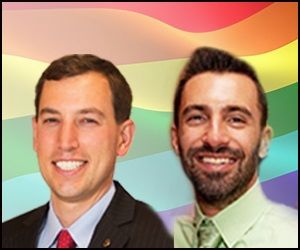Article
How Two AMA Gay Activist MDs Swayed Delegates on Gun Violence
Author(s):
The American Medical Association has seen gun violence as a problem but gun control as a sensitive issue. Not anymore.

Often, in the wake of a tragedy, people wonder, “What can I do?”
For two physicians coping with the shock of the June 12 shootings that killed 49 people at an Orlando, FL nightclub, the answers came quickly.

Jesse Ehrenfeld, MD, of Vanderbilt University School of Medicine (left in photo graphic), and Joshua Cohen, MD, (right) formerly of Mount Sinai in NY were at the AMA’s annual House of Delegates meeting in Chicago when then horrific news of the shooting hit.
It was particularly devastating since the victims were killed at a gay nightspot. Both physicians are active in LGBT causes.
Cohen proposed asking fellow delegates to make a special memorial contribution to the Honor Fund, one he founded two years ago through the AMA Foundation. It is designed to improve the quality of care—and access to it—for the LGBT community. Cohen announced at the meeting that he would personally match all contributions up to $10,000.
Then Ehrenfeld contacted him and offered to add $5,000.
By the time the meeting was over two days later, they had raised $71,414 in delegates’ contributions, including the $15,000 in matching funds. The fund now has a total of about $300,000 Cohen said.
Cohen also penned a resolution that spurred the AMA to take a more active role in addressing gun violence. The measure asked the delegates to identify gun violence as a public health crisis, not just a problem. It also asked the AMA to endorse lobbying Congress to lift a federal ban on funding research into the underlying causes of gun violence.
The measure was introduced for consideration as a late resolution with only Cohen as a sponsor.
Cohen said he then began building a team to help spread the word among delegates and look for co-sponsors. By the time it came to a floor vote 48 hours later (photo), there were 56 co-sponsors—most of them state delegations and delegations representing specialty societies. It passed by a near-unanimous voice vote.
“We’ve never seen such an overwhelming support of co-sponsorship,” said Cohen, adding that usually one person, or maybe two, will co-sponsor a resolution.
In introducing the resolution, Ehrenfeld joined Cohen at the microphone and gave a moving personal speech.
“Given the targeted violence at a gay club in Orlando, I remembered very vividly when I came out at the age of 19, talking to my mom and dad,” Ehrenfeld said in a recent interview, recounting what he said at the meeting.
“My mom was very, very afraid,” Ehrenfeld said. His mother was not so worried about people rejecting him, but was afraid someone would physically harm him.
“That fear isn’t something that has been at the forefront of my mind as I’ve lived my life,” Ehrenfeld recalled. It was, however, after Orlando.
“It’s a sobering reminder of how much there still is to be done,” he said.
Ehrenfeld, like Cohen, has a long history of using his position, standing, and voice to try and speak for others who may not be able to speak for themselves.
In discussing his LGBT advocacy activities, Ehrenfeld describes a seminal moment, saying, “I was deployed to Afghanistan as a Lieutenant Commander, and I was sitting in a town hall meeting with the US Secretary of Defense, and there was a transgender airman there, and I realized that this person had no voice because of the ban on transgender service, but I did.”
He says that his work with the AMA, as well as his standing within academic circles, has given him some trust and understanding.
“I have a voice, but there are so many people in our country who don’t have that voice, they don’t have the capacity to speak for themselves--It’s increasingly, incredibly important for me to use my voice to speak for those who cannot speak for themselves,” he said.
Both physicians said that asking for donations to the Honor Fund was an appropriate memorial to the gay victims of the Orlando shooting.
The fund will provide fellowships in caring for LGBT patients. “This is novel, because no one else is doing a full fellowship,” Cohen explained.
A significant body of research shows that members of the LGBT community face numerous healthcare disparities compared to the general population. Rates of suicide are far higher among the LGBT population, for instance, as well as higher rates of nicotine use, addiction, and many other issues.
“One of the best ways to address disparities is to specifically educate providers on the needs of a given community,” says Cohen.
When the Honor Fund was created, ten founding donors were recruited, then together they discussed how to best support the LGBT community.
Providing the fellowship training does that, and has the added benefit of improving medical education. Cohen says that they hope to be able to launch the first LGBT health scholarship within the next year.
Both physicians are hopeful that the AMA will be able to affect change in national policies on gun violence, particularly regarding the ban on research.
“An epidemiological understanding [of the underlying causes of gun violence] is important so that we can come together to understand how to prevent harm, violence, and death from gun violence,” Ehrenfeld said.
Neither Ehrenfeld nor Cohen think that the AMA will be able to get the ban lifted alone. “This is obviously going to be a very difficult political battle,” says Cohen. “I believe the AMA will make a difference. But I don’t think the AMA will be able to do it alone.”
Many groups will need to come together to form a broad coalition and speak collectively, he said.
Biographical Note:
Jesse Ehrenfeld, MD is an associate professor of anesthesiology, surgery, biomedical informatics, and health policy at Vanderbilt University School of Medicine, Nashville, TN and is the first openly gay member elected to the board of trustees of the American Medical Association (AMA).
Joshua Cohen, MD, formerly a neurologist at Mount Sinai in NY, NY, is the Associate Medical Director for Migraine at Teva Pharmaceuticals. He serves as a delegate to the AMA House of Delegates as a member of the Medical Society of the State of New York delegation. He has served on the Board of Directors for the AMA Foundation for three years and was recently elected President-elect.





